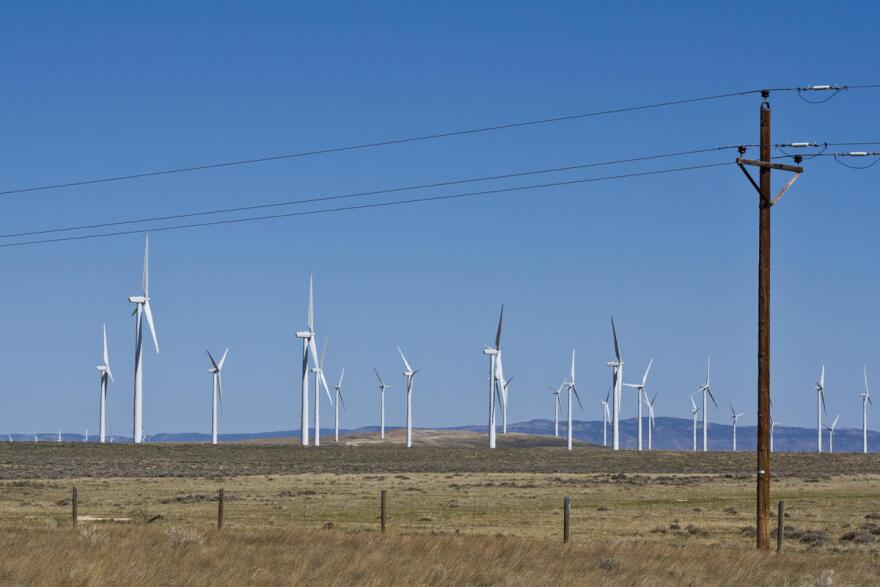It’s the third of four weeks in the 2018 budget session. With the current revenue crunch, many bills have revolved around spurring new revenue, finding new sources, or cutting back on spending. And for energy, it’s no different. The surviving bills also come down to money. Thirteen bills arose related to energy, with only three still moving through the system. There are others that relate, but are not directly tied to energy. The bills include one that incentivizes new wind development, another attracting new oil and gas development and, lastly, one making sure counties get the tax money they’re owed.
Four bills arose around wind energy, but the one surviving is about making Wyoming more attractive to new development. Lander Senator Cale Case has supported it and other pieces of legislation that would help build a framework to support wind development — while getting the state something back.
“People are just beginning to understand the ramifications of gigantic wind farms in our landscape,” he said.
With a bill dying that pushed for a hike in the production tax, the surviving piece of legislation around wind is House Bill 152. It would give wind companies a property tax exemption if they buy and store equipment in Wyoming. Case said, right now, many wind companies operating here are leaving their equipment elsewhere.
"They’re coming to Wyoming whether we pass this property tax break or not, but this would allow us to get something for them and encourage industry here,” he said.

The next energy bill, which has now passed both houses, is House Bill 72. It would protect counties from a systematic issue where mineral companies aren’t paying ad valorem taxes — an annual tax paid to counties when minerals are severed from the ground. This bill would help counties avoid legal recourse if they aren’t able to fully collect those taxes. Gillette Senator Michael Von Flatern said it’s a step in the right direction.
“That was only one part of that. The real root of that problem are the ad valorem monthly collections. Right now, you can wait even 18 months before you pay your ad valorem tax,” he said.
According to a report from the Powder River Basin Resource Council, Wyoming counties are missing out on over $42 million in ad valorem taxes from 2006 to 2016. That money is critical to financing both the local and state school systems, in addition to county services.
Von Flatern said says he hopes to see another study on mineral tax delinquency in the next interim session. He also mentioned bonding as a potential solution.
One bill in particular, though, has attracted a lot of attention and controversy.
“The severance tax could be a big one,” Von Flatern said.
Senate File 98 would cut severance taxes in half for oil and gas companies after the second year of production until the end of the fourth. Senate President Eli Bebout is a sponsor. He said Wyoming has a larger tax than other states like Colorado, and that this bill could help attract new oil and gas development.
“Wyoming has a very, very difficult time competing with our state to the south and other plays in the country,” he said.
Bebout added that a severance tax exemption could be an incentive to win over companies deciding where to locate. But many disagree, primarily because there’s been no recent analysis about whether the exemption would actually spur development.
Chuck Mason, a University of Wyoming economics professor, explained, “it matters a lot whether or not the tax reduction has a minor effect or a large effect. If it has a minor effect, you’re giving money away. If it has a larger effect, you’re probably increasing your revenues. And so, that’s kind of the debate.”

Mason said any tax revenue is also relatively small by the time this exemption would kick in. He said he has a difficult time imagining how the discount could result in a big increase in tax collections.
"You’d have to have a pretty meaningful reduction in costs, I think, in order to tilt the scales,” he said.
In the year 2000, a University of Wyoming report analyzed the impact of severance tax exemptions due to a similar bill that arose back then. It said that small changes in severance taxes would not directly stimulate drilling. Several advocacy groups have pointed to the report in voicing opposition to the bill.
Casey Quinn, a Powder River Basin Resource Council lobbyist and organizer, said, “we’ve been really fighting this bill because time and time again there’s no data to support that lowering severance taxes benefits the state's economy.”
And Senator Cale Case said the bill is moving further and faster because it carries the thumbprint of Senate leadership.
“The trouble is it’s not going to make any money for Wyoming. We’re going to lose money on this bill. And this is a time we shouldn’t be losing money,” he said.
Soon after, the full Senate voted for the bill 17 to 13. With the affirmative vote, SF-98 has since been introduced into the house and referred to the revenue committee at the time of publication. The ad valorem tax collections bill has passed both houses. The wind energy equipment storage bill has been introduced in the Senate and referred to the minerals committee. The legislature will decide the fate of these bills and others in the next week.
EDITOR'S NOTE: This story previously identified ad valorem taxes as one-time rather than annual. The mistake has been corrected.








